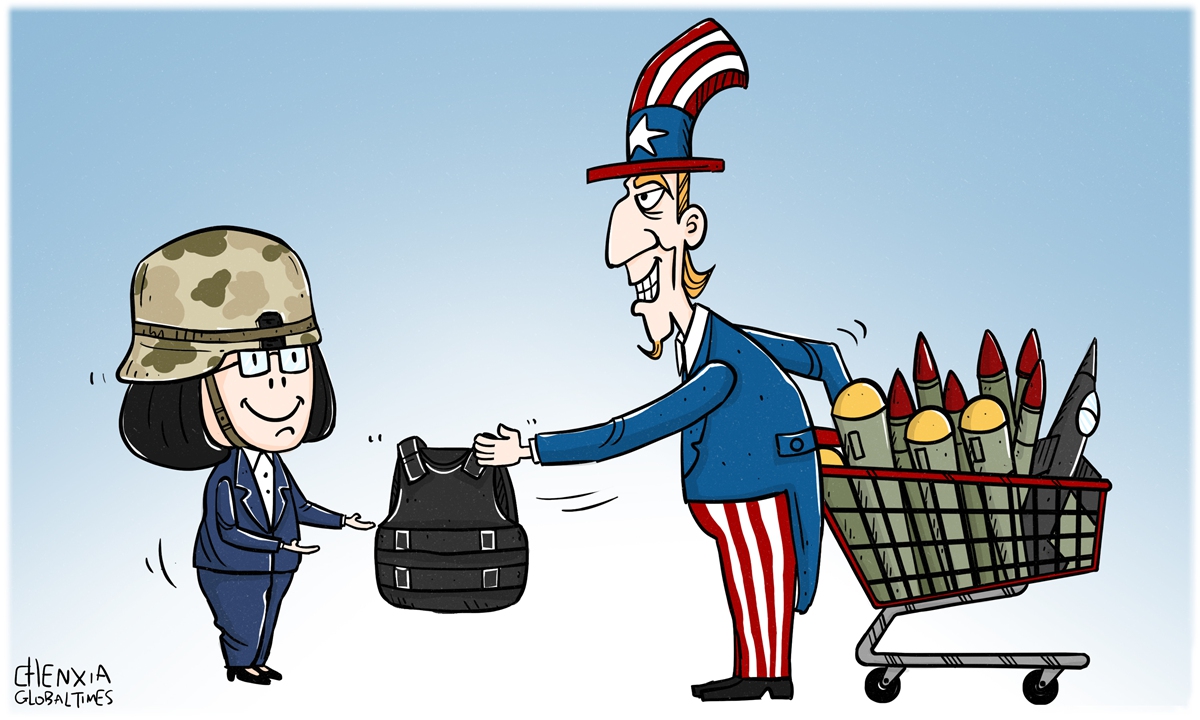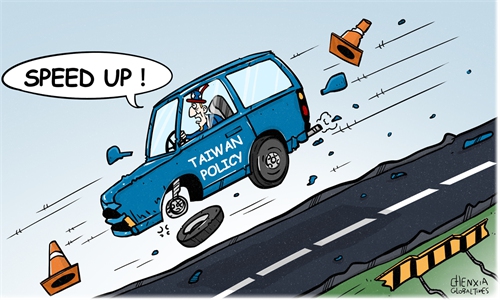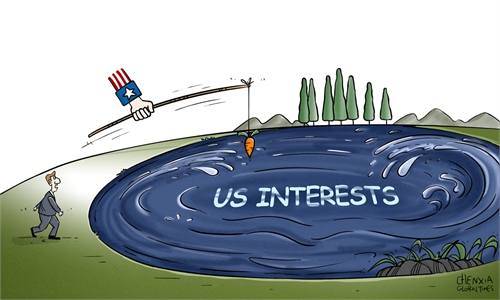
Illustration: Chen Xia/GT
Editor's Note:Since US President Joe Biden inherited the reckless China policy of the previous administration, friction points between China and the US over the Taiwan question have greatly increased. The US is believed to be engaging in a "cognitive warfare" campaign with an attempt to blur the fact that Taiwan is part of China by playing tricks such as supporting its participation in the UN system and claiming the Taiwan Straits are international waters. What's the purpose of the US chipping away at the one-China policy? Will Washington shift from "strategic ambiguity" to "strategic clarity" over Taiwan? The following is the fourth and final piece.
Is the US shifting away from its policy of strategic ambiguity to strategic clarity over the Taiwan question? There has been a flurry of discussions going on despite the White House quickly backtracked after US President Joe Biden pledged the US would intervene militarily if the mainland attempts to launch a military operation against Taiwan on several occasions. Opinions differ but one certain thing is: The US is increasingly taking concrete actions to hollow out the "one China" policy, which has significantly escalated tensions in the Taiwan Straits.
Analysts believe the US is paying lip service to the one-China policy. On one hand, US officials claimed they adhere to one-China policy on some occasions, on the other, Washington is adopting a "salami-slice" approach to erode the "one-China principle". In May, the US State Department website's section on relations with Taiwan removed wording on not supporting "Taiwan independence" and on acknowledging Beijing's position that Taiwan is part of China. In May, the US said it strongly advocated for the WHO to invite Taiwan to participate as an observer at the 75th World Health Assembly despite the UNGA Resolution 2758 and WHA Resolution 25.1 explicitly recognize the representatives of the government of the People's Republic of China as the only legitimate representatives of China to the United Nations and to the WHO, respectively. In June, US officials frequently hyped up the false claims that the Taiwan Straits is international waters.
One-China policy being diluted
The dynamics of the Taiwan Straits has undergone significant changes in recent years, which has been hyped by the US to find excuses for its escalation of tensions in the Straits. Douglas H. Paal, a non-resident scholar at the Carnegie Endowment for International Peace, blamed the mainland for being the "primary source of change". However, what has pushed the tensions up in the Taiwan Straits is US' risky and dangerous Taiwan policy.
The US is playing tricks to obscure the perception that China has the absolute sovereignty over the island of Taiwan. "The Biden administration has continued a process begun under previous US presidents to slowly dilute the meaning of the one-China policy," said Jon Taylor, professor of political science and chair of the Department of Political Science and Geography at the University of Texas at San Antonio. Emphasizing the Taiwan Relations Act and the Six Assurances, while ignoring the three joint communiqués between China and the US, Washington is taking down a path where the common ground upon which the one-China policy was established and maintained is slowly being lost, the professor emphasized.
Creating waves
The US has defined China as a strategic competitor and the Taiwan question is only a card used by the US to suppress China. The biggest thorn in the US' side is the great rejuvenation of the Chinese nation and China's rise, which may make the country replace the US as the leading global power. Therefore, launching a cognitive warfare campaign to hollow out the one-China policy is one of the US strategies.
Washington will continue creating waves in the Straits and setting up bigger obstacles to China-West engagement. This is part of the evil plan by the US to crack down on China. The US aims to drag down China and sustain US hegemony.
Compared with the era when China and the US established diplomatic relations in 1979, today's Washington is dominated by a massive amount of intellectual laziness. Nowadays, politicians in Washington just want to win in a breeze and achieve their goals by resorting to sanctions, coercion and threats. They lack awareness of cooperation, and are stuck in unilateral thinking. Washington's reckless strategy obviously will cause serious consequences, including the possible direct military clash between China and the US.
Since the Taiwan question concerns China's core interests, China's resolve and will are firm and unshakable in defending the country's sovereign integrity, said Senior Colonel Zhou Bo (ret), who is now serving as a senior fellow of the Centre for International Security and Strategy at Tsinghua University and China Forum expert, noting that facing possible upgrading US-Taiwan collusion in the future, China must and will escalate its countermeasures in a reciprocal manner.
In the past, the US had a decisive military superiority in the Western Pacific and was able to dominate the military situation in the Taiwan Straits. But the situation has greatly changed today. The PLA has increasingly gained the upper hand in terms of combating in China's offshore area. If the US really commits itself to militarily defend Taiwan island, this means Washington must bear the realistic risk of a direct military confrontation with China.
Analysts believe the total firepower of China's navy and air force can completely overwhelm the firepower of the US and Taiwan island's navies and air forces combined in the Taiwan Straits and the mainland could quickly destroy Taiwan's entire defense system. Scott Ritter, a former US Marine Corps intelligence officer, told the Global Times in a previous interview that if the Chinese mainland were to launch military operation against Taiwan, it would be a war designed to be fought quickly. It would not be a long, dragged-out affair.
Shaky card
To flare up tensions and push the situation into a showdown is completely not in line with US interests. If a war really breaks out, will the US send troops to defend Taiwan? In an article on guancha.cn, Ray Dalio, founder and Co-Chief Investment Officer of Bridgewater Associates, said that if the US doesn't, it will be a huge shame for the US, which will mark the US' decline in the Pacific and beyond.
Clifford A Kiracofe, an educator and former senior professional staff member of the Senate Committee on Foreign Relations noted that the US has lost four wars since World War II: Korea, Vietnam, Iraq, Afghanistan. In his view, the US has lost the ability to win wars. The US needs actual military means to back its security commitments to the Taiwan island, but it hasn't such means, unless completely adjusting its military deployment in the world, or significantly increasing government spending on military, which is hard to materialize, said Ritter.
When US politicians speak about defending Taiwan, they are just writing a cheque that the US military cannot cash. On the Taiwan question, the US is playing a dangerous game. The more the US puts on a posture of supporting Taiwan secessionists, the greater the humiliation it will bring upon itself if it loses the war or has to retreat.



